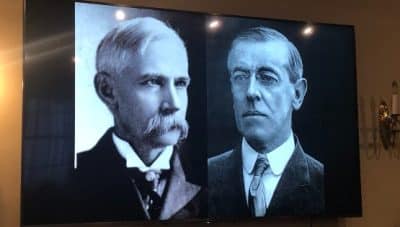
A closely-contested ballot initiative in California last year outlawing marriage between homosexuals became, in the crucial final days, a referendum on what ought to be taught in schools. Those who opposed gay marriage warned that its sanction by society at large meant that even young schoolchildren would be subjected to classroom discussion of the issue. Advocates for same-sex marriage denied the accusation.
Opponents of gay marriage won by the narrowest of margins, which sparked heated recriminations in the pro-gay-marriage camp and the issue has stayed red hot through 2008 and into 2009. However, what about the claim that what was at stake was not only adults’ rights, but children’s educational curriculum? First, is it true? Second, is the relationship between education and politics an inescapable fact of life, or is there a solution?
Whatever one believes about gay marriage, it is hard to believe that its passage wouldn’t increase exposure to the new legal standard or that the issue wouldn’t be addressed in public schools. Indeed, there are already battles in school districts across the country over how these issues are handled in school.
Many parents with religious or other deeply-held objections to gay marriage are especially concerned that their children are subjected to these lessons in school, where students learn both respect for authority and fundamental social values. Many progressives simply see the issue as a necessary part of a child’s education and exposure to the modern world with all its diversity.
Are we all doomed to a no-holds-barred fight over what we teach our children, over value-intense issues like prayer in school, sex education, and intelligent design? But what about those practical-minded souls who wish to avoid an intense, interminable civil war over the cultural beliefs in public schools? Every parent should ask himself/herself about the effects on children’s learning if schools are just another battleground in the culture wars.
For the partisans of these issues, are they ready to lose any of these battles in the zero-sum game of politics? Would a progressive proponent of comprehensive sex education be ready to consign millions of children in Red America to abstinence-only instruction? Or creationism? Or America-First civics?
Our decentralized political structure ensures that subjects that are politicized will be decided differently in different locations, but every child in a district will be forced to learn the same thing regardless of their parent’s desires..
The sheer size and diversity of the U.S. means that disagreements are unavoidable. Just as with churches, the answer to knotty questions of values is to allow freedom and diversity, not coercion and monopoly. Our current system takes power from every parent and concentrates it in the hands of the governmental and educational “elite” (you call them “the school board”).
Politically-controlled education standards inevitably turn curricula into a contest for politicians and activists. Fortunately, there are other options.
What we need instead is to allow families, neighbors, and religious establishments the freedom to create and exercise more options. We need educational diversity to match our ethnic and value diversity.
Many studies have shown that a choice-driven education system will improve the quality of children’s education and save taxpayers huge sums of money. However, it will also allow for teaching values in school; something all parents want, but which cause interminable and irreconcilable conflicts in a government-run system.
We can avoid conflicts and give parents what they wish for their child’s education by adopting a choice-driven system of dollar-for-dollar education tax credits. Tax credits for donations to scholarship organizations will help support school choice for lower-income families, and personal-use credits will help middle-class families.
Education tax credits can create an educational system with a focus on student learning that respects parent and taxpayer rights. In a tax credit system, no taxpayer is compelled to support an education with which she disagrees, and no parent is forced to send his child to a school that conflicts with his values.
Political infighting and bureaucratic rule-making consume too much of our attention and energy as real learning is pushed to the side by distracting, destructive cultural warfare. Let’s move beyond the battles and embrace educational freedom instead.
– Column by Adam B. Schaeffer, Ph.D. and Chaim Katz. Schaeffer is an adjunct senior fellow with the Education Reform Initiative at the Virginia Institute for Public Policy, and a policy analyst at the Cato Institute’s Center for Educational Freedom. Katz is a Ph.D. candidate in political science at the University of Virginia.)










